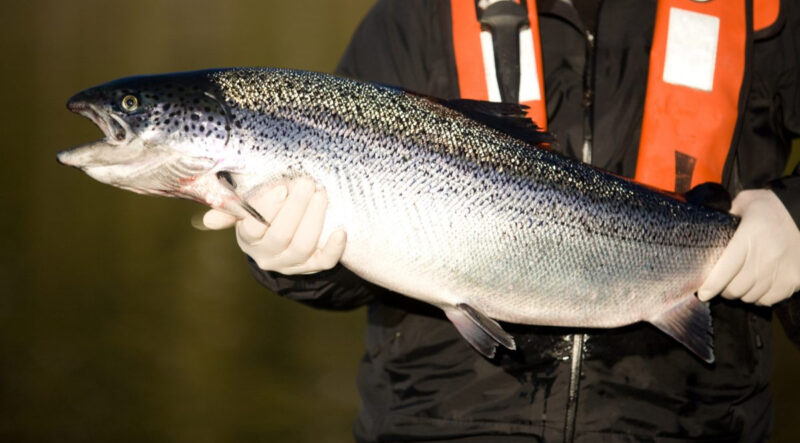Top scientists rip fake claims by anti-fish farm activists
“Home-grown, ocean-farmed salmon is a valuable food resource for Canadians. It is an affordable, highly nutritious protein with year-round access” – Canada’s top fisheries and aquaculture scientists
By Fabian Dawson
SeaWestNews
Canada’s top fisheries and aquaculture scientists are urging the public and politicians not to believe the claims against salmon farms being made by activists, saying their widely propagated assertions are not backed by science.
In a rare public defence against the activists, nine scientists, who are participants in the rigorous assessments done by the Canadian Science Advisory Secretariat (CSAS), have also cautioned the Federal government that it should make decisions on the future of aquaculture in BC, based on the best available science.
Signalling that the Trudeau Liberals should not be bowing to the demands of the anti-fish farm activists, the scientists said in a letter : “ministers charged with making decisions on the future of salmon aquaculture should trust the scientific facts that were presented in the recent CSAS reports concerning an industrial food sector that offers Canadian food security, and that is increasingly being adopted by First Nations along B.C.’s enormous coastline.”
CSAS coordinates the scientific peer review and science advice for Fisheries and Oceans Canada (DFO).
Those CSAS reports, include nine-peer reviewed studies that showed the 35-year-old aquaculture operations in BC’s Discovery Islands, had virtually no impact on wild stocks migrating through the area.”
Pressured by the anti-salmon lobby, which constantly threatens to withhold it’s support for the Trudeau Liberals, former Fisheries Minister, Bernadette Jordan ordered the closure of 19 salmon aquaculture sites in the Discovery Islands on December 16, 2020, despite the scientific studies.
The Federal Court has since ordered the government to set aside its decision.
The recent letter, published in the Globe and Mail, comes as the Federal Government is set to make a decision on 79 salmon farming licences which are set to expire June 30.
The activists and their scientists have been claiming without a shred of evidence that DFO has been covering up studies that show open-net salmon farms pose a threat to wild stocks.
The MPs at a recent parliamentary hearing in turn have been giving them a friendly ear without challenging any of their conspiracy theories nor their discredited science.
Below is an excerpt of the letter by the scientists, which echoes the views of other experts quoted in SeaWestNews recently;
“Accusations have recently been levelled against Fisheries and Oceans Canada, or DFO, and its use of science to regulate salmon farming.
Specifically, the House of Commons Standing Committee on Fisheries and Oceans heard from an organized group of scientists and anti-salmon farming activists who alleged that the DFO withheld certain studies. The group also criticized recent Canadian Science Advisory Secretariat reports concerning potential risk to wild salmon of pathogens from farmed salmon as being unreliable, because the reports did not support the activists’ claim that salmon farming poses significant harm to wild salmon.
As scientists who have contributed to many peer-reviewed analyses on salmon conservation and farming for the DFO, we’re compelled to respond to prevent propagation of any misinformation. Canadians can trust the scientific facts and advice presented by CSAS, the science evaluation body of the DFO.
Home-grown, ocean-farmed salmon is a valuable food resource for Canadians. It is an affordable, highly nutritious protein with year-round access. Such salmon – which is currently front and centre as the federal government is deciding whether to renew British Columbia salmon-farming licences – is affordable, in part, because it taps into renewable and free tidal power (driven by lunar cycles) for renewing oxygen and seawater.
Farmed-salmon aquaculture also has a low carbon footprint. This is partially because salmon are neutrally buoyant in water, needing less energy to survive, and the carbon dioxide they produce stays dissolved in seawater. The nutritious aspect of farmed salmon is, in part, a result of farmers looking after fish welfare and ensure the salmon are rich in omega-3 fatty acids.
Canadians need a reliable, sustainable and secure food system. All food production in Canada is regulated for safety, environmental impact and quality. This includes the rigorous regulatory oversight given to farmed salmon, which is also subject to passionate advocacy on both sides. In this context, responsible political decision making and a legal system to oversee fairness are crucial.
But providing reliable scientific advice to our elected leaders about environmental and food-science issues can be a challenge because they are not trained in these areas.”
The letter was signed by the following;
Tony Farrell, a professor and Canada Research Chair for fish physiology, culture and conservation at the University of British Columbia.
Tillmann J. Benfey, a professor of biology and director of animal care at the University of New Brunswick.
Mark Fast, a professor and chair of the department of pathology and microbiology at the Atlantic Veterinary College.
Kurt Gamperl, a professor and associate director of the Department of Ocean Sciences at the Memorial University of Newfoundland.
Ian Gardner, a professor emeritus at the University of Prince Edward Island and the University of California, Davis.
Jim Powell, managing director of Fidelis Aquaculture Management Ltd.
Crawford Revie, a professor of epidemiology at the University of Prince Edward Island and chair of data analytics.
Spencer Russell, an associate professor at the Department of Fisheries and Aquaculture at Vancouver Island University.
Ahmed Siah, managing director at the BC Centre for Aquatic Health Sciences
(Image of a farmed salmon courtesy of Mowi)


Comments are closed.